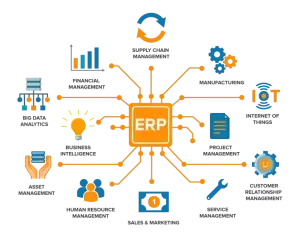In 2025, sustainability is no longer a trend but an indispensable focus for real estate developers, property managers, and business owners alike. As the world shifts toward greener solutions, ERP software has become instrumental in the facilitation of sustainability within real estate. By reducing energy consumption to better manage resources, ERP software allows organizations to track, manage, and optimize their operations for a more sustainable future.
How ERP Solutions Are Changing Real Estate
ERP solutions are transforming the real estate sector through automation and increasing efficiency in operations. These systems allow businesses to manage energy use, handle resources efficiently, and facilitate smooth maintenance that contributes to cost savings and sustainability in all real estate operations.
Role of ERP in Energy Efficiency
ERP software for real estate streamlines the operations of developers and property managers to ensure more energy efficiency. The incorporation of real-time energy monitoring and analytics into ERP systems enables their clients to track energy use across buildings more precisely. This helps the enterprises make informed decisions on the proper use of energy and cuts down on waste to result in better energy performance.
Streamlining Resource Management Through Automation
Resource management, from water to building materials, is very important in real estate for sustainability. ERP solutions automate the processes of inventory management, procurement, and resource allocation for optimal usage. By reducing waste and limiting unnecessary consumption of resources, an ERP system contributes to greener and more cost-effective operations of real estate.
Benefits of ERP Software to Sustainable Real Estate Development
ERP software will help in sustainable real estate development through cost reduction, improved energy efficiency, and sustainability regulatory compliance. It enables the real estate company to develop eco-friendly initiatives that will lead to increased tenant satisfaction while creating attractive, energy-efficient properties.
Reduction of Operational Costs by ERP
Sustainability is not only about environmental benefits but also about financial gains. ERP software helps reduce operational costs by identifying inefficiencies and automating key processes. Real estate businesses can manage utilities, maintenance, and other operational expenses more effectively, saving a lot of costs while contributing to sustainability goals.
Enhancing Tenant and Stakeholder Satisfaction
Issues of sustainability concern both tenants and stakeholders more and more. Using ERP systems that emphasize energy efficiency, environmental care, and resource management might just help real estate companies garner tenants who are ecologically sensitive and stakeholder relationships in general. ERP provides Crystal Clear reporting, demonstrating efforts toward sustainability and building trust within the community.
Enable Sustainability Compliance and ESG Reporting
ERP solutions reduce much of the drudgery in tracking energy usage, emissions, waste, etc. and generating reports thereof, which supports businesses to comply with legislations relating to sustainability. Seamless reporting on ESG facilitates global standards for such reporting while demonstrating the commitments toward sustainability by real estate players.
Ease into Environmental Regulations with the Use of ERP
While the legislation on sustainability is increasingly becoming strict, ERP software helps an organization comply with various legislations. It also simplifies tracking and reporting environmental data, thus assuring companies that they will meet various local and global sustainability standard requirements. For instance, the ERP system can even produce automatic reports on energy consumption, emissions, waste management, etc., all to help in compliance within a shorter period of time.
Make Data-Driven Decisions for Sustainability
ERP solutions put actionable, real-time data at the fingertips of any business to drive decision-making with the goal of sustainability. It could be to evaluate the trend of energy use, identify areas of inefficiency, or forecast the resource needs for the future; ERP systems empower businesses to make informed choices that align with their sustainability goals. Data-driven decisions accelerate the transition towards more sustainable practices in real estate.
Features an Ideal Real Estate ERP Will Need for Sustainability
It should include features such as real-time energy monitoring, predictive maintenance, and integration with green technologies that assure resource optimization. This helps real estate businesses meet their sustainability goals through better operation management.
Energy Monitoring and Utility Management
Another essential function that an ERP system for real estate does is energy monitoring and utility management. This involves looking out for software with built-in capabilities to connect to properties’ energy meters and sensors to monitor usages across different properties. This will provide insight into finding inefficiencies, thus improving it by saving resources and reducing costs.
Integration with Green Building Technologies
The adaptation of green building technologies, including smart thermostats, solar panels, and energy-efficient HVAC systems, has been growing among real estate businesses. With the integration of such technologies into ERP software, operational and sustainability metrics can be managed seamlessly, hence enabling the business to track the performance of green building assets with due effectiveness.
2025 Trends in Real Estate ERP for Sustainability
Looking ahead to 2025, real estate ERP systems will increasingly leverage AI, IoT, and data analytics to drive sustainability. These innovations will enhance energy optimization, automate resource management, and help businesses align with evolving sustainability goals in both local and global markets.
Rise of AI and IoT for Smart Resource Optimization
In 2025, AI and IoT will be the most prominent contributors to resource optimization in real estate. Integrate AI into ERP systems to automate resource management, predictive maintenance, and energy optimization. Similarly, IoT sensors connected with ERP systems provide real-time insight into building performance and further enhance sustainability efforts.
Global and UAE-Specific Sustainability Goals Supported by ERP
As sustainability goals evolve globally, the UAE is also making strides toward a greener future. With initiatives such as the UAE’s Net Zero 2050 and Dubai’s Green Building Regulations, ERP software is helping businesses align with these goals. ERP systems in the UAE are tailored to help real estate organizations meet local sustainability standards while also supporting broader global initiatives.
Overcoming Challenges in Adopting ERP for Sustainability
Implementing an ERP system for sustainability may have some challenges, like data integration and system customization. However, with the proper strategy and support, these challenges can be overcome to achieve significant improvements in efficiency and sustainability for a business.
Addressing the Complexities of Implementation
While ERP systems come with enormous advantages, their implementation can be very complicated for real estate businesses with a large number of properties and various operations. Overcoming challenges in data integration, user training, and system customization opens ways to the full exploitation of ERP for sustainability.
Achieving ROI through Sustainable Operations
Although the initial investment in ERP software can be quite high, the long-term ROI is undeniable. With ERP, the efficiency of operations improves, meaning resources are wasted less and their usage becomes more sustainable, which helps an enterprise economize over time. Additionally, tracking the sustainability metrics and cost savings that a company realizes by deploying the ERP software aids in justifying the investment and furthers other green initiatives.
Case Studies: ERP Driving Sustainability in Real Estate
Different practical case studies reveal how ERP solutions assisted real estate companies in trying to reduce carbon footprints and energy use, hence developing overall operational efficiency. Some key cases showing the power of ERP’s positive influence on driving real estate operations toward sustainability follow.
Example of Carbon Footprint Reduction
Various real estate organizations have, therefore, implemented ERP systems to help reduce their carbon footprint. Energy consumption tracking, optimization of resource use, and the use of green building technologies are some of the means through which such businesses have reduced greenhouse gas emissions very significantly. The ERP systems, while very important in measuring and reporting such reductions, make it easier for businesses to achieve their targets related to sustainability.
Successful Energy Optimization Initiatives
Perhaps the best way ERP could support sustainability in real estate is by optimizing energy. Different real estate companies have applied ERP solutions to monitor the energy usage of different properties and automatically actuate the systems to perform better by highlighting their inefficiencies. This eventually yields substantial energy savings, adding to the global call for sustainability in real estate.
Want to take your real estate operations to the next level by imbuing them with sustainable ERP? Ready and raring to go greener? Then get in touch with us today and find out how our ERP software can support your efforts toward sustainability. Begin Your Journey of Sustainability NOW!



